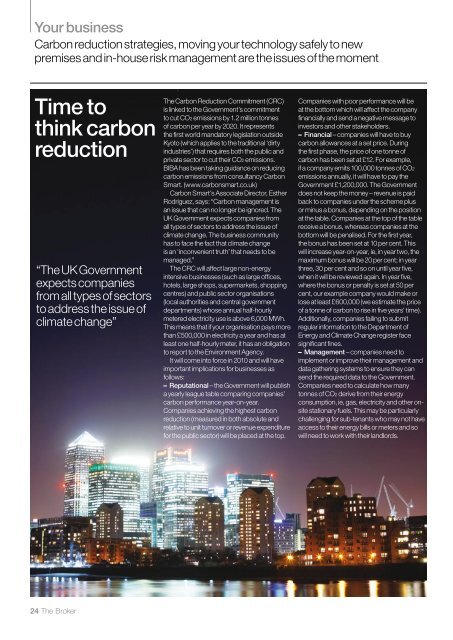The Broker - British Insurance Brokers' Association
The Broker - British Insurance Brokers' Association
The Broker - British Insurance Brokers' Association
You also want an ePaper? Increase the reach of your titles
YUMPU automatically turns print PDFs into web optimized ePapers that Google loves.
Your business<br />
Carbon reduction strategies, moving your technology safely to new<br />
premises and in-house risk management are the issues of the moment<br />
Time to<br />
think carbon<br />
reduction<br />
“<strong>The</strong> UK Government<br />
expects companies<br />
from all types of sectors<br />
to address the issue of<br />
climate change”<br />
24 <strong>The</strong> <strong>Broker</strong><br />
<strong>The</strong> Carbon Reduction Commitment (CRC)<br />
is linked to the Government’s commitment<br />
to cut CO2 emissions by 1.2 million tonnes<br />
of carbon per year by 2020. It represents<br />
the first world mandatory legislation outside<br />
Kyoto (which applies to the traditional ‘dirty<br />
industries’) that requires both the public and<br />
private sector to cut their CO2 emissions.<br />
BIBA has been taking guidance on reducing<br />
carbon emissions from consultancy Carbon<br />
Smart. (www.carbonsmart.co.uk)<br />
Carbon Smart’s Associate Director, Esther<br />
Rodriguez, says: “Carbon management is<br />
an issue that can no longer be ignored. <strong>The</strong><br />
UK Government expects companies from<br />
all types of sectors to address the issue of<br />
climate change. <strong>The</strong> business community<br />
has to face the fact that climate change<br />
is an ‘inconvenient truth’ that needs to be<br />
managed.”<br />
<strong>The</strong> CRC will affect large non-energy<br />
intensive businesses (such as large offices,<br />
hotels, large shops, supermarkets, shopping<br />
centres) and public sector organisations<br />
(local authorities and central government<br />
departments) whose annual half-hourly<br />
metered electricity use is above 6,000 MWh.<br />
This means that if your organisation pays more<br />
than £500,000 in electricity a year and has at<br />
least one half-hourly meter, it has an obligation<br />
to report to the Environment Agency.<br />
It will come into force in 2010 and will have<br />
important implications for businesses as<br />
follows:<br />
– Reputational – the Government will publish<br />
a yearly league table comparing companies’<br />
carbon performance year-on-year.<br />
Companies achieving the highest carbon<br />
reduction (measured in both absolute and<br />
relative to unit turnover or revenue expenditure<br />
for the public sector) will be placed at the top.<br />
Companies with poor performance will be<br />
at the bottom which will affect the company<br />
financially and send a negative message to<br />
investors and other stakeholders.<br />
– Financial – companies will have to buy<br />
carbon allowances at a set price. During<br />
the first phase, the price of one tonne of<br />
carbon has been set at £12. For example,<br />
if a company emits 100,000 tonnes of CO2<br />
emissions annually, it will have to pay the<br />
Government £1,200,000. <strong>The</strong> Government<br />
does not keep the money – revenue is paid<br />
back to companies under the scheme plus<br />
or minus a bonus, depending on the position<br />
at the table. Companies at the top of the table<br />
receive a bonus, whereas companies at the<br />
bottom will be penalised. For the first year,<br />
the bonus has been set at 10 per cent. This<br />
will increase year-on-year, ie, in year two, the<br />
maximum bonus will be 20 per cent; in year<br />
three, 30 per cent and so on until year five,<br />
when it will be reviewed again. In year five,<br />
where the bonus or penalty is set at 50 per<br />
cent, our example company would make or<br />
lose at least £600,000 (we estimate the price<br />
of a tonne of carbon to rise in five years’ time).<br />
Additionally, companies failing to submit<br />
regular information to the Department of<br />
Energy and Climate Change register face<br />
significant fines.<br />
– Management – companies need to<br />
implement or improve their management and<br />
data gathering systems to ensure they can<br />
send the required data to the Government.<br />
Companies need to calculate how many<br />
tonnes of CO2 derive from their energy<br />
consumption, ie, gas, electricity and other onsite<br />
stationary fuels. This may be particularly<br />
challenging for sub-tenants who may not have<br />
access to their energy bills or meters and so<br />
will need to work with their landlords.


